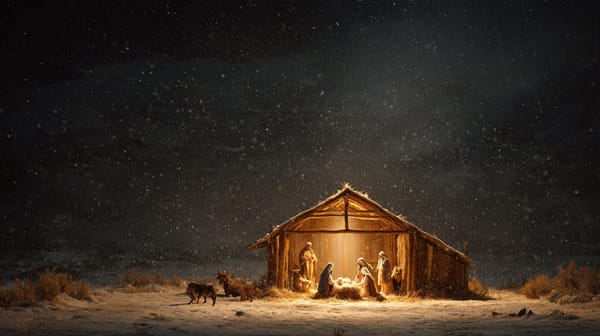Fairhaven Sermon 8-3-2025

Summary
In this week’s service, Pastor Michael Airgood delivered a deeply moving and thought-provoking sermon centered on the concepts of community, forgiveness, and embracing the complexities of human relationships. Drawing heavily from the biblical story of Hosea and Gomer, the sermon explored themes of flawed humanity, unexpected grace, and the courage to extend compassion even when facing challenging circumstances. Airgood emphasized the importance of seeing beyond surface judgments and embracing the messy, imperfect nature of both individuals and communities, advocating for a spirit of neighborliness and radical acceptance – a concept particularly relevant to Fairhaven's ethos.
The sermon also addressed the unique cultural nuances of Pittsburgh and its local dialect, specifically the term “nebby,” highlighting its surprising embrace of interconnectedness and genuine concern for one another. Pastor Airgood used this local term to illustrate the need for deliberate cultivation of relationships and understanding, encouraging the congregation to move beyond performative acts of kindness and towards authentic expressions of care and support for all members of the community, even those carrying burdens of the past.
Transcript
In Pittsburgh, we use a word that they don't use anywhere else. We have a few of them, not all that I should say from a pulpit. One of those words is nebby. Do you use nebby? Yeah.
I have lived in the Pittsburgh area longer than a decade, and I forget to say nosy when I'm outside of Pittsburgh, and I still use nebby. In fact, I think nebby is a much better word than nosy. Nosy is very confusing for non-native English speakers. I think we should hold a campaign to push for the word nebby to be used nationwide to replace the word nosy.
More than that, we don't just say nebby, we say we're being neighborly. That's part of the problem. We need to pray more specifically. We really want the details.
We'd like to spill the tea. The Armenian expression is let's sit crooked and talk straight. We like to know what is going on in our communities and to be well-informed citizens. I moved from the suburbs to the city of Clairton because I wanted to live somewhere where I know my neighbors.
And this morning, and I know my neighbors, and this morning, I'm going to be a little If I did not know who the people were, I would have thought they were kidnapping my neighbor. But I knew the people. I knew them from the community. I knew they weren't.
But they called her by the wrong name. Unsure, a nickname going all the way back to childhood. They were yelling at her to get going, to hurry, to come on. I think they were going on vacation together.
But if I didn't know my neighbors and I didn't know the people in my community, I might have been on the phone with 911 just to have someone check in on what is going on in my neighborhood. Our district superintendent over the United Methodist churches in Ukraine had always lived in cities. His wife is also a United Methodist pastor as well as a doctor and a professor in Syria. English language universities for African and Indian students studying to become doctors in Ukraine.
They had always lived in big cities, had always enjoyed the life of city, and when this war ramped up a few years ago, they looked at their young daughters and realized they had to go to the mountains where their girls would be safe. Julia said that living in a small town, when you leave your house, not only do your neighbors know that you've left your house, they know what you had in your hands. We all do what we must do to be in the ministries that God calls us to. You know, often pastors are asked, What is your favorite book of the Bible? And I read of a colleague once who has asked this in a children's moment, and so I know that I should not answer with my real answer.
Because like that colleague, my favorite book of the Bible is Hosea. And if you've read Hosea, you're nodding up and down. It is not a story for a children's sermon. And if you're not nodding up and down, wow, do I have a story for you today.
Usually when I'm asked what my favorite story book of the Bible is, I answer Mark or maybe 1 John, but really my favorite book, my favorite story of the Bible is Hosea, right? Do you all remember the show Mama's Family? We're in the right category, right? There's an episode of Mama's Family where she takes a night course or community college and they're reading the Scarlet Letter. And in class, everyone else has only read the Cliff Notes. Today we would say the Wikipedia article. But she actually had read the book.
And she sits there looking around at everyone else in the room, wondering what is wrong with them, that they are not indignant for this woman, that they truly believe she should be wearing this scarlet A on her chest. Mama doesn't understand why people aren't leaping to her defense. And when I talk about Hosea in church circles, and I see that people aren't nodding along, I say we need to get our Bibles out and start reading them together. Hosea marries a woman who is unfaithful.
Dr. Wilda Gaffney, who I think is the most brilliant living scholar of languages of the Bible, asks that when we talk about this, that we use words like the ones found in the Bible, like the ones that people really use, because we tend to use a lot of euphemisms for this. But it's interesting, we have described Hosea's wife, Gomer, using a lot of words that talk about who she was. We have called her a harlot or a whore.
We have called her a sex worker or a prostitute. But the scripture doesn't define Hosea in this way, doesn't define Gomer in this way. You see, Hosea declares as a prophet that he and his family and the life that he is living is a sermon illustration for the whole world to see. God calls Hosea to marry Hosea.
A woman with a reputation. And he does. And although our scripture never, ever, ever says that she is unfaithful to Hosea after they are married, there is no indication that she continues in anything other than faithfulness. History has continued to label Gomer with words like whore and harlot.
Hosea names his children with Gomer, bold and prophetic names, And. comparing the faithlessness, the adulterousness of his relationship, the scandal of marrying a woman with a reputation, to God choosing to align God's self with people who are so ridiculously unfaithful. Even those of us who'd like to be really good often end up doing really crummy things sometimes. We cannot get it together, and yet God chooses to be faithful to us.
Yes. If I was serving in a congregation, I'd be announcing today that I'm going to be serving a new congregation. A year ago, I took time off from serving as a local pastor. I traveled to Ukraine and then I spent the rest of the year fundraising for Ukraine.
But I have been in the candidacy process for a federated church, the Community of Reconciliation in Oakland. It's not only United Methodists, but Presbyterian Disciples of Christ and United Church of Christ. And so they're following all of those different processes. And it has taken many, many months, but I will have a call and a vote and all of that.
And so I will be returning to being a pastor today. And in conversations with the committee searching for a new pastor, I said something that felt weird when it left my mouth and I regretted it immediately. But I said that sometimes being a pastor feels like you are in performance art. And boy, doesn't that feel awful coming out.
Even now, it feels terrible. But you know, it's better to say it that way than to say, I feel like a fish in a fishbowl. And I feel so bad for Dylan with the parsonage right next to the church just tucked away. Really, a fishbowl, folks must know exactly where their pastor is and when.
You know, Jesus tells parables. He tells these stories about people, and we think that the way that Jesus told these parables was unique. It was a new invention, a new construction of unnamed people doing these things. People are acting in ways that people do not act.
A farmer is throwing seeds not just on her field, but on the sidewalks and on the roads and in the weed patches. Seeds are expensive. Farmers throw their seeds on the field. Every time Jesus tells a parable, there's something that doesn't quite line up for the people who are hearing it.
Why is he tearing down his barns to build bigger barns? Why not build more barns? Why not sell it and build something you really want? As soon as you hear this story, you start to pull on threads. Why did this happen? Dr. Wilda Gaffney invites us to use our sanctified imagination to interrogate the stories of the Bible with the knowledge that people act the way that people do. You know how people act if we start to look at the story of Hosea and pull on those threads.
We begin to see a bold and courageous prophet. We see more of God in Gomer than in Hosea, to use the words of Dr. Gaffney's sermon. We see a woman who is faithful, who has a past that her community will not forget or forgive, who has a husband who speaks about her poorly.
You know, we always talk about the best stories that a pastor can share about their kids, right? But when you talk to pastors, kids, you understand there's a price to pay. If you tell too many of those stories, those sermon illustrations, and here we have this entire book where the man says, my whole life, my children's lives, it is a sermon illustration of God's faithfulness, even though we are not faithful. I wonder if Hosea was always faithful. It doesn't seem that way.
He is a prophet respected not only by Jewish people and Christians, but also by Muslims, although not mentioned in the Quran, held up as a prophet of God. But if we use our sanctified imagination, we begin to wonder who this man was and how did he make the choices he made. Missionary life is often difficult. learning the rules and the regulations of everyday life.
How do people do the things that people do day in and day out? You have to act in a way that is normal for those around you. The missionaries that I followed, in their journey, practice they cleaned on Sundays because it was the day they had off in Ukrainian culture to clean on Sunday was the biggest sin and they'd be out with their vacuum cleaners moving about and their neighbors would think these people hate Jesus they're cleaning on the Lord's day One time I went with a friend to her family's for the Christmas celebration and I'd never done it. And all of a sudden we were all on our knees around the table praying. And so I'm trying quickly to get on my knees and then we're all standing up and we're doing a toast with a shot of vodka that Jesus is born.
And you're just following along trying to keep up. There are all these rules. Every culture has rules and norms, and Jesus breaks all of these norms. In the same way that Hosea does, Jesus' life is pushing back against the culture of his day, is making a bold and prophetic statement to all who are interacting with him.
Dr. Amy Jo Levine, a Jewish woman who studies people, the world of the New Testament era through the lens of the Gospels, Amen. finds it very interesting that in a culture that is absolutely obsessed with marriage, because marriage is a contract, it's a business deal, you are uniting empires, you are preserving wealth and wealth. heritage and history and all of these things.
Marriage is such an integral part of life. Everything is about marriage. And yet in the Gospels, after the birth story, with Jesus' parents and John the Baptist's parents, once Jesus grows up into adulthood, There is only one or possibly two married couples in the entirety of the Gospels after the birth story. Everyone is single or widowed or it's unknown or maybe someone might be married but their spouse lives somewhere else and you hear of them later.
In a world, in a culture that is absolutely obsessed with marriage, there's, Jesus calls us to a bigger family, to sharing generously with all of those around us, calling us to a beloved community that sees beyond the empires that we can build by combining wealth through contracts and marriage and says, but what if we just cared for one another? Gathering thousands at the lakeside, Jesus blessed some small loaves and fish and spread them out, and thousands were fed with baskets and baskets full left over. We often joke about how the Methodists understand the non-miraculous miracles. Growing up, I was always taught that Jesus did this and it all multiplied because this is the magic. But when you start to pull on these threads, which of these families left their home with nothing? But everyone thought, Well, if I pull out my little bit, people are going to steal from me, and I won't have enough.
But as soon as people began to share, they understood that they had more than enough for everyone. Jesus tells a parable of barns and a harvest that is greater than what can be stored. And of a man who understands that he can build even bigger barns, that barns can get so big they can hold all the grain the world has ever seen, numbers we've never seen of grain. That we can build bigger and bigger empires for ourselves.
But that this life is but a day. It comes and it goes. What are we doing this all for? Jesus tells these parables about wealth, What are we doing this all for? wanting us to pull on these threads to see if we are prioritizing our lives in the way that Jesus would want us to. Are we focused on our neighbors having all that they need to survive? Or are we focused on getting the next big thing that we would like? Jesus calls us to, to move away from the structures that hold us captive and to expand our understanding.
Who is our neighbor? Is it the person on our left and on our right and across the street and maybe behind? Or is it anyone we don't like? Who should we forgive? Is it those who have given us the best apology that meets all the criteria we are looking for, or is it everyone? Or else we risk our own forgiveness. Jesus calls us to expand our understanding of who is my mother, who is my father, who is my sibling, my aunt, my uncle, my cousin, who is my family. It is as big as this room can, as many people as this room can fit and then some. And when our family is missing, we go and find them.
that when our family is sick, we go and visit them, that when our family is lonely, we make sure that they are not always eating alone, that when our family doesn't have enough, we make sure that they do. I have blue hair and a yellow beard. I don't know if you noticed that. Because being a pastor is part performance art, and I still hate how that sounds, But we raised money for Ukraine at Vacation Bible School, and I challenged my kids if they raised so much money that I would dye my hair, and of course they did, and it's four to six weeks, and two to four weeks yet.
Family. When I talk about Ukraine, very often people ask me if my heritage is Ukrainian, and it is not. I don't have one drop of Ukrainian blood, but family is bigger than blood. It's kind of the message of our gospel, that we cannot turn our back on the other, on the stranger, on someone in prison, on someone who is hungry or thirsty or naked, because that is our family.
I'm not. And we would never let our family go naked or hungry or thirsty if we could do something about it. And so we share this good news that as the people of Jesus, we are known for the ways that we step up and make sure that those around us have enough, that spirits and bellies are fed in equal measure, that our prayers and our gifts are held with the same regard. that our spirits, our souls, and our bodies are many and one, three just as God, Father, Son, and Holy Spirit are many and one.
God calls us to a family that is bigger than our imagination, to neighbors that extend beyond our street, our state, our nation, to friends that don't look like us or speak like us or act like us. But love in the same ways that we love, act in the ways that we love, get it wrong like we do, and try our best to be faithful to the God who loves us even when we are not. May we grow in our faith that we may learn to love one another as God loves us. May it be so.
Amen.



